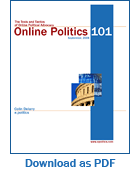Updated January, 2011

Before talk about tactics, let’s think about the medium itself. What are the salient characteristics of the internet as a political communications tool?
1. Ease. Anyone with an internet connection can set up a website or launch an email campaign — the only significant barriers to entry are knowledge and time. Of course, the deeper your pockets, the more you can do, but the internet is unique among communications media in the extent to which it allows citizens to participate as the equals of major corporations and interest groups. Little guys can look and fight like big guys in the online world — and vice versa (just who IS behind that “grassroots” site you were reading yesterday?). As a New Yorker cartoon once put it, “On the Internet, no one knows you’re a dog.”
2. Speed. An organization or activist can learn about a piece of legislation in the morning, get fact sheets and statements online by noon, generate thousands of emails to Congress by happy hour and spark bloggers and journalists to write about it all along the way. And, of course, opponents can do the same.
3. Reach. The internet does indeed span the globe, as all those nice Nigerian gentlemen who write me for help transferring money have found out. This wide reach gives bloggers and Twitterers a tall soapbox, but more broadly, it lets all of us gather together based on what we care about regardless of where we live. This tendency to cluster helps campaigns reach people more likely to respond to their messages, allowing them to find and aggregate supporters by interest rather than by location. I.e., the internet connects campaigns and activists with scattered supporters they’d never meet in the physical world, just as Ebay helps you find that ecstatic Singaporean buyer for your signed photo of The Fonz .
4. Interconnection. Linking is the web’s vital technology and its essential characteristic. True since the first web page flickered up on the first web browser almost 20 years ago, it’s still true today — the central brilliance of the latest generation of web tools (Facebook, blogs, YouTube and the rest of the so-called Web 2.0 technologies) is that they rely on people’s desire to create connections for their strength. On the web, links between ideas enhance the value of the individual pieces, just as the links between people create a web of relationships that enhance our lives. It’s a classic example of the network effect.
As we’ll talk about next, the same idea holds true for the different parts of an online advocacy campaign: your website helps build your email list, which creates an initial audience for your hilarious-but-serious video clip, which sends traffic back to your site, which builds your email list even further, which helps you grow a donor base, which helps fund the website and your Facebook advertising. Just like a pyramid scheme, only distressingly legal.

Its a new political tool, very very inspiring!
[…] As best put by Colin Delany at epolitics.com, the Internet is an enormous political tool. Colin has analyzed the Internets ability to function as a political tool and has broken it down into four basic principles. In short, they include: […]
Great website.
Jonathan Cahn
Chairman
Phelps Stokes Fund
[…] a dog, or in this case that your “revolution” is one. Just as the ‘net can make a tiny organization look huge, it can also mask official or establishment voices — for instance, how many […]